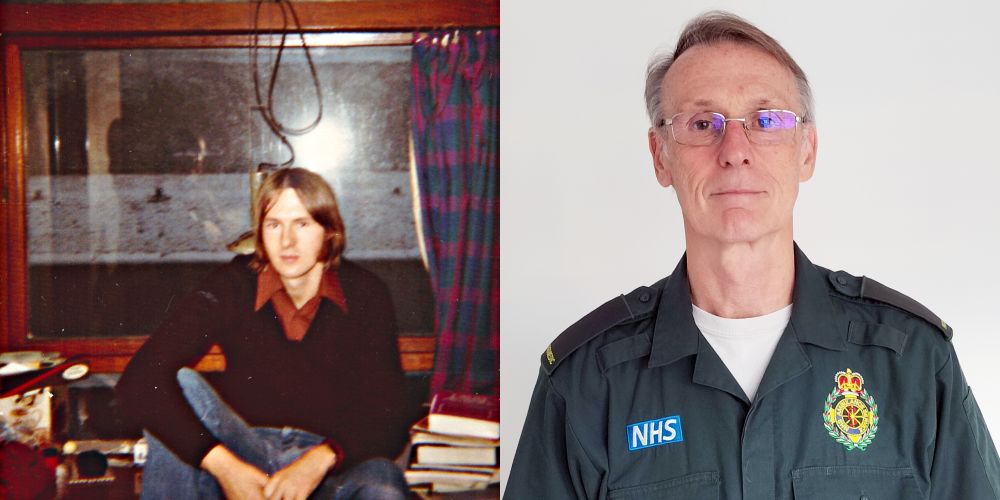
To Peter Watters (Pharmacology 1980), age is just a number. After a varied career in teaching and IT, he retrained to work as a paramedic on the NHS frontline, aged 64.
“You’re 64, why did you do this? That’s what people keep asking me,” Peter said.
“Because I could. That’s the answer.”
Peter has found his calling. The stresses of the NHS frontline might not appeal to many people nearing their state pension, but for Peter, there is nowhere else he would rather be. “I wish I’d done it 30 years ago. I come home at the end of every day knowing I’ve made someone’s life better – and longer, in some instances.”
In fact, his life experience has helped him to thrive in the new role, bringing with it both knowledge and experience in the face of stressful situations. “It goes all the way back to my time at Leeds,” he said. “That’s what kick-started my passion for evidence-based learning which I’m using today.
“If anyone is considering a career change, if you’re healthy enough and you still have the thirst for knowledge, there’s nothing that should stop you.”
It’s not just a profession for younger fitter people. I work with a huge number of colleagues covering a range of ages, sizes, genders.
Although Peter’s steps to become a paramedic came later in his career, his passion for healthcare and medicine began whilst studying pharmacology at Leeds. “There were fantastic facilities and the lecturers were experts in their fields,” Peter recalled. “We were in the old medical school at first, and then we moved into the new one – the Worsley building, which is probably considered old now.”
Peter enjoyed Leeds for its academic prestige, combined with a memorable music scene. He remembered seeing the likes of Camel and Lindisfarne in the Refectory.
After graduating, he was unsure whether to commit to a career in pharmacology, so he opted for a PGCE. He became a teacher, before switching to a role in IT. “My career has come down to opportunity,” he said. “You put the pieces in place and the opportunities often present themselves. I enjoyed teaching, but when the chance came to do something new again, I took it.”
It is an approach that has taken him around the world. A teaching role in North Carolina, USA, followed, before he worked as the director of IT at a school in Surrey. He later moved to the Lake District and began a holiday cottage business. “But with that one, I was at home all day cleaning,” he said. “I started to go stir crazy, I was used to socialising.
“I joined St John’s Ambulance because my daughters were a part of it, and I was dropping them off and picking them up anyway. It brought back all the memories of pharmacology at Leeds.
“I became emergency transport on events, which is when I saw an advert for emergency medical technicians.
“I went for it.”
After seven years in the role, an apprenticeship opportunity led to him study as a paramedic at Carlisle University.
Once qualified, Peter took on greater responsibilities for patient management – far beyond what people typically expect. “It’s a broad remit – people often see the paramedic role as putting a patient in an ambulance and moving on, but it's changing. You’ve got to set patients on the right care pathway and make patient management decisions, and it’s a qualification that can see you working with the air ambulance, in care homes, in GP surgeries or in A&E.
“We’re expected to keep up to speed with literature around techniques, drugs, and patient management and revise protocols accordingly. We become researchers in our own right. That builds upon a lot of what I did at Leeds into treatments and the way they work.”
Where his Leeds studies might help prepare him for knowledge-based aspects of the role, the emotional side draws on a different skillset – particularly in a trauma scenario. “It’s a challenge, but you’ve got to detach yourself from what you’re seeing and the emotions of people on the scene. You step back and follow your protocols to help those patients. It might hit you afterwards, but at the time you can't get distracted. We do have a good structure in place to deal with psychological issues afterwards.”
And it is in those times of stress that Peter’s life experiences can play a part. “I suppose people look at you differently as an older person,” Peter said. “They see you as being more knowledgeable, a bit more of a calming influence, perhaps.
“At the end of the day, we each bring our own skills. It’s not just a profession for younger fitter people. I work with a huge number of colleagues covering a range of ages, sizes, genders.”
And despite his passion for the work, does Peter have plans to slow down any time soon? “I will do it as long as I can,” he said. “I couldn’t retire and take to my garden – I’m useless at growing things anyway.”
Further information
For further details, email Ed Newbould, Digital Communications Officer, University of Leeds at e.w.newbould@leeds.ac.uk.